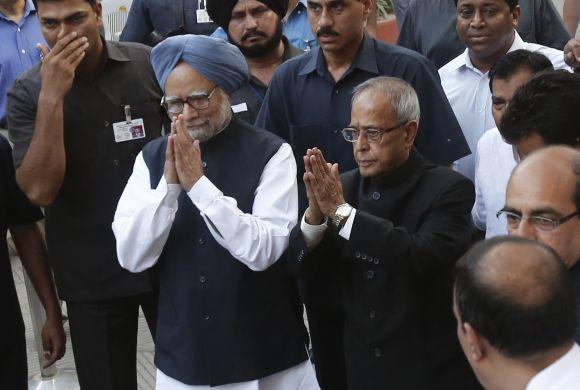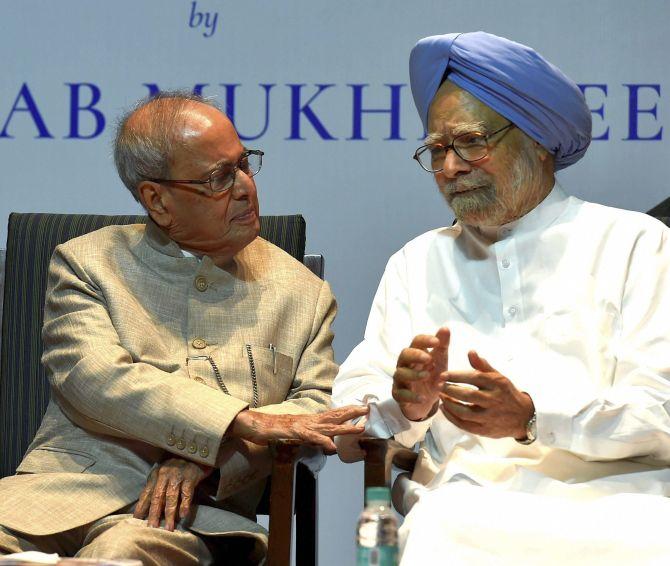Manmohan Singh, reveals the former President, was keen that either P Chidambaram or Montek Singh Ahluwalia be the finance minister.
Archis Mohan reports.

Former President Pranab Mukherjee has said he was reluctant to join the United Progressive Alliance (UPA)-I government in 2004, and had informed Congress President Sonia Gandhi about this.
Mukherjee has spoken about his political journey, especially the UPA years in the third volume of his autobiography, The Coalition Years: 1996 to 2012. The book was launched on Friday, October 13.
On his joining the UPA-I, Mukherjee writes: 'Some media commentators reported that I would not join the government because I could not work under Manmohan Singh, who had been my junior when I was the finance minister.'
At the launch on the book, Dr Singh had said Mukherjee had every reason to be aggrieved for not becoming the prime minister.
Among other revelations, Mukherjee writes that Sonia Gandhi wanted him to be the finance minister, but he told her that he would not like to given his ideological differences with Manmohan Singh.
He also told her that he would prefer the home portfolio over external affairs, and it was at the swearing-in that he got to know that he would be the defence minister.
According to Mukherjee, Dr Singh was keen that either P Chidambaram or Montek Singh Ahluwalia be the finance minister.
Sonia Gandhi wanted Mukherjee to hold dual responsibility -- a ministerial portfolio and Planning Commission deputy chairman. This was something he had been entrusted with in the P V Narasimha Rao government.
However, Mukherjee says Dr Singh wanted Ahluwalia, and finally his view prevailed.
According to the former Congress leader who had debuted in the Lok Sabha for the first time in his long political career in 2004, the Congress president insisted that he should join the government since he would be vital to its functioning.
On the UPA-II years, Mukherjee has said in an interview published subsequent to the book launch in the news magazine India Today that the downfall of that government was caused as much by the party's 'inflexibility' in those years such as its failure to manage coalition partners, particularly once he quit the government and shifted to Rashtrapati Bhavan.
Mukherjee was the UPA government's preeminent crises manager.
He said it was difficult to handle West Bengal Chief Minister Mamata Banerjee and they had confrontations, and 'she (Banerjee) used to get very angry with me but nonetheless I could keep her in the coalition.'
Mukherjee shifted to Rashtrapati Bhavan in July 2012, he writes, and Banerjee quit the government in October.
The former finance minister has said the Congress thought its 200 seats were equal to 280 seats. 'So the flexibility of mind and flexibility to accept others' views was restricted.'
In his book, the former President also commented that another coalition partner, Nationalist Congress Party chief Sharad Pawar was also, by the middle of 2012, not satisfied on several issues.
But Mukherjee, in the interview, has said the Congress is bound to recover. 'You cannot simply erase a party with a history of over 132 years. It will recover,' he said.
On the slump in the gross domestic product, Mukherjee, who has had two stints as the country's finance minister, has said that his advice to the Prime Minister Narendra D Modi-led government would be a huge capitalisation of public sector banks, handle problems with resoluteness but without creating panic in the system by making too many changes too frequently, and provide stimulus in public spending in order to generate demand.
He has also written on the goods and services tax in his book: 'We must not forget the Constitutional challenge that awaits this game-changing reform. The legislation, in its present form, can be questioned by the Supreme Court as its affects the basic structure for tax imposition as envisaged in the Constitution.'
Mukherjee was shifted to the finance ministry in January 2009 after Chidambaram was made home minister in the wake of the 26/11 Mumbai terror attacks in November 2008.

At the finance ministry, the veteran Congress leader writes that Manmohan Singh did not agree with his views on modifying the financial structure, but was supportive of the initiative to set up the Financial Stability and Development Council, but the then Reserve Bank of India governor D Subbarao had some reservations.
Mukherjee writes he discussed the issue with Dr Singh. 'I pointed out that Subbarao, who was too much of a monetarist, had been thrust upon me.'
Dr Subbarao had been given a two year extension from September 2011.
'The much-publicised stand-off between the RBI and the government stemmed from the fact that (Subba) Rao had limited understanding of autonomy,' Mukherjee writes.
According to Mukherjee, Dr Subbarao maintained that his statutory appointment had authorised him legally to formulate the nation's monetary policy. 'However, in reality, the governor only enjoyed functional independence. Constitutionally, it was the finance minister alone who was accountable to the people.'
In his book, Mukherjee writes the Left parties had suggested his name for the post of President in 2007, but Sonia Gandhi had ruled his name out since she didn't have a substitute for him as Leader of the House in the Lok Sabha, and could not spare him from the Cabinet or from party matters either.
In 2012, Mukherjee met the Congress president on the evening of June 2. The Left parties and some others favoured that he be the Presidential candidate.
At the meeting, Sonia Gandhi asked Mukherjee if he could suggest a substitute, given the crucial role he played in the government's functioning.
Mukherjee replied he has always been a loyal party man and would discharge whatever responsibility is given to him.
'The meeting ended, and I returned with a vague impression that she might wish to consider Manmohan Singh as the UPA Presidential nominee. I thought that if she selected Singh for the Presidential office, she may choose me as the prime minister. I had heard a rumour that she had given this formulation serious thought while on a holiday,' he says.
Mukherjee recounts another incident that at least seemed to confirm to him in his mind that the Congress president might not want him to be President.
Mukherjee writes how he lost his cool in the Lok Sabha on an issue and Sonia Gandhi had passed him a glass of water to calm his nerves on the suggestion of Bharatiya Janata Party leader Murli Manohar Joshi.
'This is why you can't be President,' the Congress president had told him.
He has written Sharad Pawar was instrumental in influencing the Thackerays towards Mukherjee's candidature.
Mukherjee writes that he met Shiv Sena chief Bal Thackeray during his campaigning to gather support for his candidature despite Sonia Gandhi's disapproval.
Mukherjee felt that a man who had broken away from his traditional coalition partners, the BJP, to support his candidature should not feel humiliated.
Later, Mukherjee was told by a Congress leader that Sonia Gandhi and her adviser Ahmed Patel were upset that he met Thackeray.
The former President has also written how he had protested the arrest of Jayanendra Saraswati, the shankaracharya of Kanchi, on November 12, 2004 when the country was celebrating Diwali.
During the Cabinet meeting, Mukherjee criticised the timing of the arrest. He questioned whether the basic tenets of secularism of the Indian State were confined to only Hindu monks and seers.
'Would the state machinery dare to arrest a Muslim cleric during Eid festivities?' he asked.
M K Narayanan, then special advisor to the PM, also agreed with Mukherjee, who issued immediate instructions for the shankaracharya to be released on bail.
Mukherjee has written that in 1999, Pawar attacked Sonia Gandhi's foreign origins since after she became the party president she consulted P Shiv Shankar on all important issues rather than Pawar.
On the nuclear deal, Mukherjee writes that he tried to reason with the Left and sought the intervention of Jyoti Basu 'who was convinced about the merit of the nuclear deal.'
According to Mukherjee, Basu spoke to Prakash Karat (then the CPI-M chief) and suggested that there might be value in Karat meeting Mukherjee, which Karat did but continued to oppose the deal.
'His open defiance of Jyoti Basu and the Bengal lobby was quite surprising. I believe that Ramachandran Pillai and K Balakrishnan incited Karat to lead the Left agenda,' Mukherjee writes.
The Left withdrew its support to the UPA-I and voted against the government in Parliament.
IMAGES: TOP: Then prime minister Dr Manmohan Singh and Pranab Mukherjee after the latter's election as President, July 22, 2012. Photograph: Adnan Abidi/Reuters
BOTTOM: Pranab Mukherjee with Dr Singh at the launch of the former President's book, The Coalition Years: 1996 to 2012 in New Delhi, October 13, 2017. Photograph: Atul Yadav/PTI Photo











